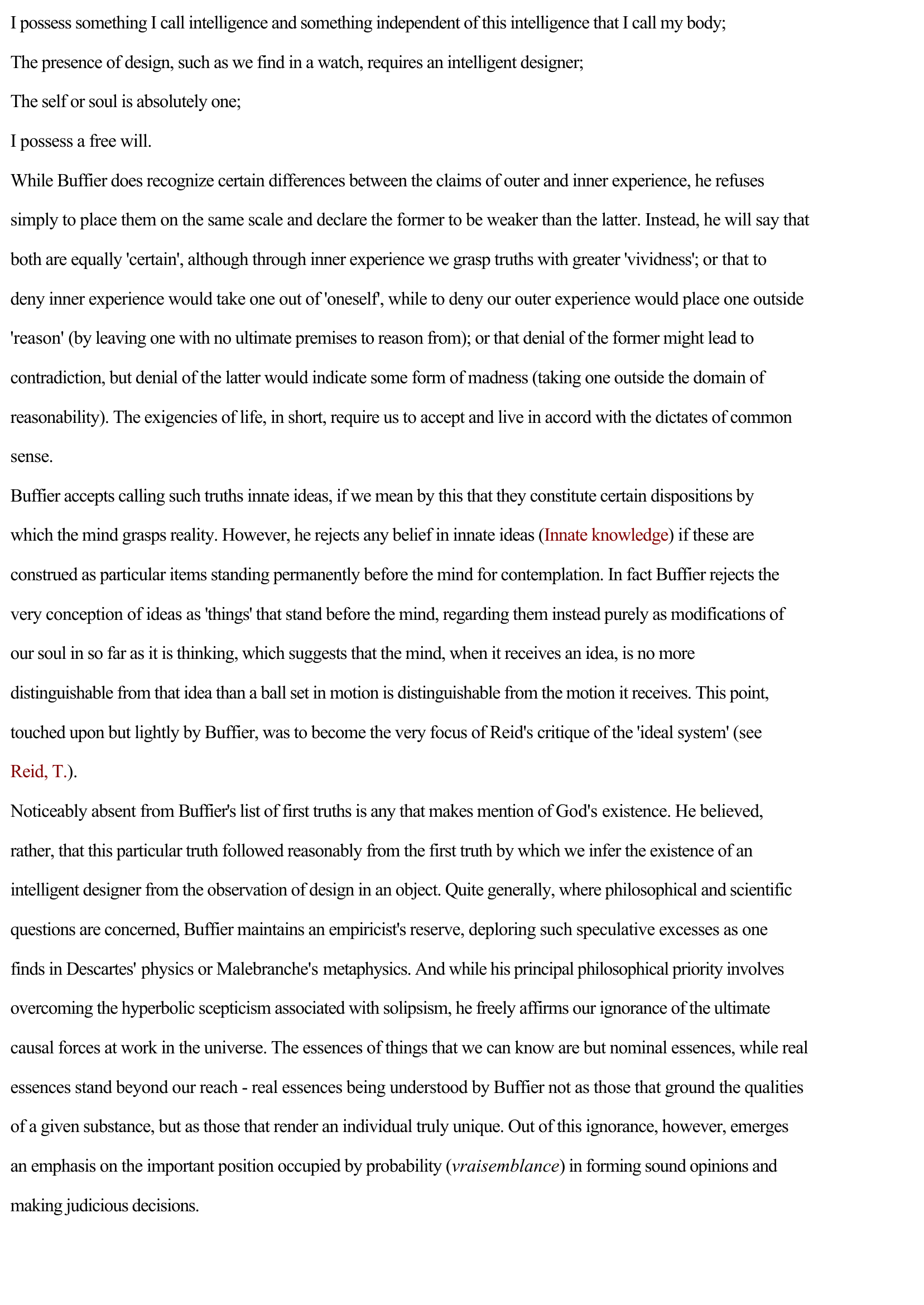Buffier, Claude
Publié le 22/02/2012

Extrait du document
«
I possess something I call intelligence and something independent of this intelligence that I call my body;
The presence of design, such as we find in a watch, requires an intelligent designer;
The self or soul is absolutely one;
I possess a free will.
While Buffier does recognize certain differences between the claims of outer and inner experience, he refuses
simply to place them on the same scale and declare the former to be weaker than the latter.
Instead, he will say that
both are equally 'certain' , although through inner experience we grasp truths with greater 'vividness'; or that to
deny inner experience would take one out of 'oneself' , while to deny our outer experience would place one outside
'reason' (by leaving one with no ultimate premises to reason from); or that denial of the former might lead to
contradiction, but denial of the latter would indicate some form of madness (taking one outside the domain of
reasonability).
The exigencies of life, in short, require us to accept and live in accord with the dictates of common
sense.
Buffier accepts calling such truths innate ideas, if we mean by this that they constitute certain dispositions by
which the mind grasps reality.
However, he rejects any belief in innate ideas ( Innate knowledge ) if these are
construed as particular items standing permanently before the mind for contemplation.
In fact Buffier rejects the
very conception of ideas as 'things' that stand before the mind, regarding them instead purely as modifications of
our soul in so far as it is thinking, which suggests that the mind, when it receives an idea, is no more
distinguishable from that idea than a ball set in motion is distinguishable from the motion it receives.
This point,
touched upon but lightly by Buffier, was to become the very focus of Reid's critique of the 'ideal system' (see
Reid, T. ).
Noticeably absent from Buffier's list of first truths is any that makes mention of God's existence.
He believed,
rather, that this particular truth followed reasonably from the first truth by which we infer the existence of an
intelligent designer from the observation of design in an object.
Quite generally, where philosophical and scientific
questions are concerned, Buffier maintains an empiricist's reserve, deploring such speculative excesses as one
finds in Descartes ' physics or Malebranche 's metaphysics.
And while his principal philosophical priority involves
overcoming the hyperbolic scepticism associated with solipsism, he freely affirms our ignorance of the ultimate
causal forces at work in the universe.
The essences of things that we can know are but nominal essences, while real
essences stand beyond our reach - real essences being understood by Buffier not as those that ground the qualities
of a given substance, but as those that render an individual truly unique.
Out of this ignorance, however, emerges
an emphasis on the important position occupied by probability ( vraisemblance ) in forming sound opinions and
making judicious decisions..
»
↓↓↓ APERÇU DU DOCUMENT ↓↓↓
Liens utiles
- Claude Bernard : Introduction à l'étude de la médecine expérimentale (fiche de lecture)
- Histoire de l’art S2 devoir 1 Claude Monet : Le déjeuner sur l’herbe
- Claude Gueux: lettre de défense
- Commentaire linéaire de La Route des Flandres, de Claude Simon
- Analyse de texte Claude Levi-Strauss

































